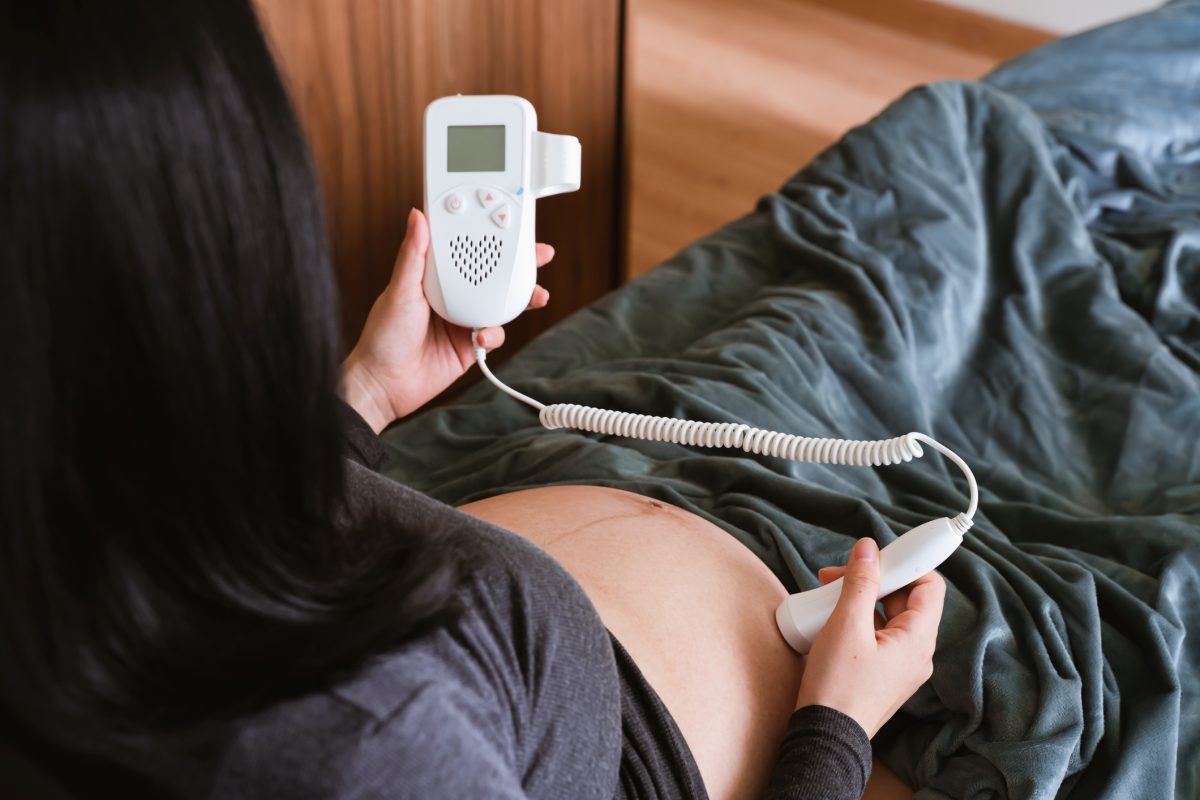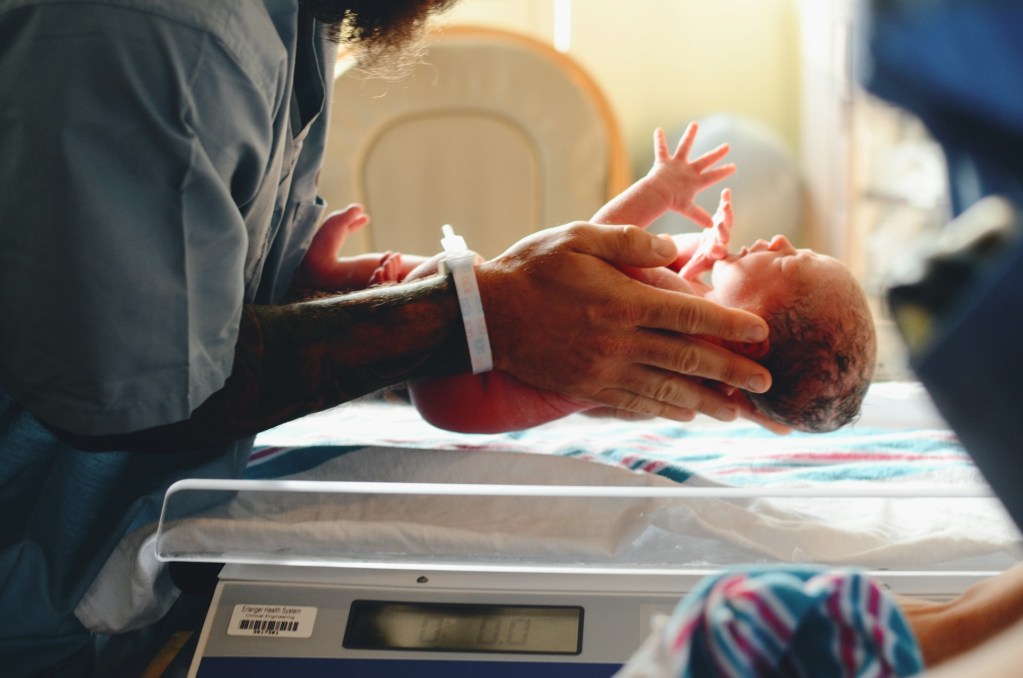There are several different reasons why your doctor will estimate your baby’s fetal weight throughout your pregnancy. For expectant parents, there’s endless fascination in discovering everything possible before the baby is born, including birth weight. But, knowing how much your baby weighs while in the womb isn’t just a good way to help mentally prepare for childbirth, it’s also an important marker for fetal development that can impact wellness outcomes during childhood and adolescence.
Low birth weight can affect brain development in infancy and childhood, as studies have shown that it impacts cerebral cortex development well into adolescence. The cerebral cortex is the area of the brain responsible for functions such as consciousness, thought, emotion, reasoning, language, and memory. It’s a pretty big deal.
Monitoring fetal weight during a person’s pregnancy is important for more reasons than just helping to determine how the actual birth is going to go. Low birth weight is related to undesirable outcomes in the delivery room, so adjusting the mother’s care plan to increase fetal weight before delivery is in everyone’s best interests. We’ll help you navigate determining your baby’s weight in the womb and why that matters. Keep reading to learn more about an estimated fetal weight calculator.
How do healthcare providers determine fetal weight?

Fetal weight calculations, no matter who they are done by, are only estimates. There is no way to be 100% accurate in determining fetal weight until that baby comes out, but doctors have established algorithms based on ultrasound measurements and clinical observations that allow them to have a pretty accurate estimate when it comes to determining fetal weight.
There are several formulas for determining fetal weight and your healthcare provider will use the one they are most comfortable with. The margin of error is close to plus or minus ten percent. But even an educated guess is best when wanting to keep mother and baby as healthy as possible.
What is the normal weight for a fetus?

On average, most babies born between 37 and 40 weeks gestation tend to fall somewhere between 5 pounds, 8 ounces, and 8 pounds, 13 ounces, according to Nemours. This is a generality and doesn’t mean that babies born lighter or heavier won’t be healthy, but those who fall outside those parameters may be more diligently monitored by doctors.
Studies show that “normal fetal size at birth varies significantly by race/ethnicity, sex, parity, and maternal size, as well as other genetic and physiological factors.” It has been shown that factors such as the size of both parents, birth order, gender, and whether the baby is a multiple can all impact their fetal weight. Although many factors can impact fetal birth weight, maintaining a healthy lifestyle during pregnancy is something all expectant parents can do to help their fetus grow as expected.
Determining fetal weight at home

If you want to try your hand at determining your baby’s fetal weight at home, you don’t need an advanced medical degree. Or any degree at all. There are fetal weight calculators online where you plug in a few numbers and the program does all the heavy lifting. All you need to know is some basic information about your pregnancy and your baby’s size.
Even though the final numbers won’t be completely accurate, if you have concerns about your baby’s weight or development, discuss them with your healthcare provider to determine if you should make changes to your care plan.
How to use a fetal weight calculator

The National Institute of Child Health and Human Development’s fetal growth calculator is a straightforward and easy-to-use program to determine your baby’s estimated fetal weight. The calculator will provide you with your baby’s weight percentile based on the results.
To use the calculator, you’ll need a few measurements of your peanut. Ask your ultrasound technician to write them down for you at your next appointment, and every appointment after, so you can keep an up-to-date account of your baby’s growth.
Measurements to determine fetal weight:
- Gestational age: The number of weeks and days pregnant you are
- Biparietal diameter: The diameter of the head side to side
- Head circumference: The distance around the entire head
- Abdominal circumference: The distance from the top of the pubic bone to the top of the belly
- Femur length: The length of the femur or thigh bone
- Race: After the 20th week of pregnancy, fetal weight differs greatly by race
These measurements are generally given in millimeters, but if yours aren’t, you’ll need to convert them. Once you have your baby’s measurements, you just pop them into the calculator.
The calculator will provide you with a range of percentiles for each category and fetal weight estimates based on four different calculations. Each weight is also accompanied by a percentile. These numbers all carry the almost 10% margin of error previously mentioned. Fetal weight calculators are guidelines, and the weights provided are not set in stone. If your results worry you, discuss them with your healthcare provider.
What causes low birth weight?

A baby is considered low birth weight if they’re born weighing less than 5 pounds, 8 ounces, as per Stanford Medicine. Although some babies with low fetal weight may have serious health problems, others can be born perfectly healthy.
One of the main causes of low birth weight is being born premature, while another cause “is a condition called intrauterine growth restriction.” This can be the result of placenta issues or health issues of the mother or baby. Stanford Medicine also notes that the following can contribute to low birth weight:
- Infection during pregnancy
- Not gaining enough weight during pregnancy
- Previous pregnancy with a low birth weight baby
- Smoking
- Alcohol or drug use
- Age less than 17 or more than 35 years
- African-American background
Seeing a doctor or other healthcare provider regularly can ensure you’re maintaining a healthy pregnancy. If you’re concerned about your weight gain, make sure to address it with your doctor.
How to increase fetal weight

The most important thing you can to do bolster your baby’s health is to be healthy yourself. Eating a balanced diet, staying hydrated, taking prenatal vitamins, getting adequate sleep, and exercising will improve the health of your nugget during pregnancy. If your fetal weight is too low, your doctor will discuss steps to take to increase weight gain before birth.
What can cause an incorrect fetal weight estimate?

Although fetal weight calculators can be pretty accurate, with a margin of error of around 15%, there are instances where these estimates are further off. Variations in fetal position, such as the baby being curled up or lying in an unusual position, can make it challenging to take accurate measurements during ultrasound scans.
The skill level of the ultrasound technician can also impact the estimate as can the BMI of the mother, as obesity can sometimes impact the clarity of the imaging. Low levels of amniotic fluid may also obscure details of the fetus. Errors can occur if the formulas used to calculate weight from fetal measurements are not adjusted for individual variations, such as ethnicity or maternal health conditions like diabetes.
Closing thoughts

Above all, it’s important to communicate with your healthcare team about any concerns you may have. But don’t let stress about your baby’s birth weight negatively impact your mental health. The chance of your baby being bigger or smaller than the predicted birth weight is normal. Just like sometimes the sex is incorrectly determined or there are surprise twins, your baby can come out weighing more or less than predicted.
Also, percentiles are just that, percentiles. If your baby is measuring in the 60th percentile, that means they are measuring bigger than 60% of babies at the same gestational age, with the 50th percentile being average. A baby in the 99th percentile is bigger than almost every other baby of the same gestational age, and that could mean changes in delivery plans.
If you want to know additional aspects of your child’s development, want to share some extra information with your partner, or need to keep closer track of your precious bundle for health reasons, knowing how to use a fetal weight calculator is a good idea. Keep yourself and your pregnancy on track and have fun seeing if your nugget comes out close to the weight you’ve calculated.




